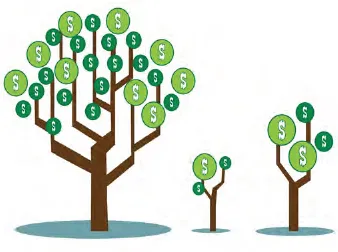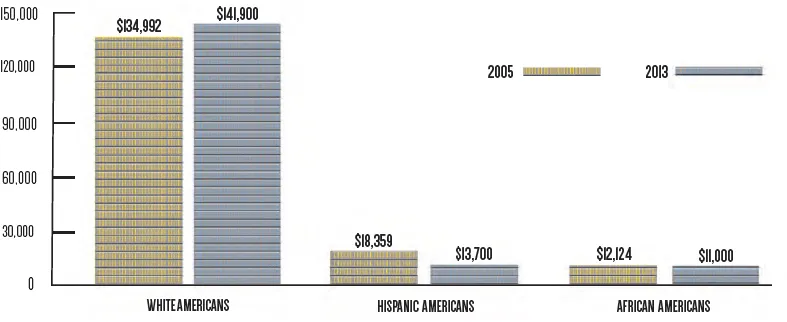
eBook - ePub
Making Ends Meet
How Should We Spread Prosperity and Improve Opportunity
Tony Wharton
This is a test
Condividi libro
- 28 pagine
- English
- ePUB (disponibile sull'app)
- Disponibile su iOS e Android
eBook - ePub
Making Ends Meet
How Should We Spread Prosperity and Improve Opportunity
Tony Wharton
Dettagli del libro
Anteprima del libro
Indice dei contenuti
Citazioni
Informazioni sul libro
For many Americans, the recovery from the 2007 recession, a recovery that officially began in 2009, feels very remote, or nonexistent. Even as the stock market surges and millions of jobs have been created, they see a very different picture. Many Americans still believe in the basic notion that anyone who works hard should be able to support a family and get ahead. What can we do to make that happen?
Domande frequenti
Come faccio ad annullare l'abbonamento?
È semplicissimo: basta accedere alla sezione Account nelle Impostazioni e cliccare su "Annulla abbonamento". Dopo la cancellazione, l'abbonamento rimarrà attivo per il periodo rimanente già pagato. Per maggiori informazioni, clicca qui
È possibile scaricare libri? Se sì, come?
Al momento è possibile scaricare tramite l'app tutti i nostri libri ePub mobile-friendly. Anche la maggior parte dei nostri PDF è scaricabile e stiamo lavorando per rendere disponibile quanto prima il download di tutti gli altri file. Per maggiori informazioni, clicca qui
Che differenza c'è tra i piani?
Entrambi i piani ti danno accesso illimitato alla libreria e a tutte le funzionalità di Perlego. Le uniche differenze sono il prezzo e il periodo di abbonamento: con il piano annuale risparmierai circa il 30% rispetto a 12 rate con quello mensile.
Cos'è Perlego?
Perlego è un servizio di abbonamento a testi accademici, che ti permette di accedere a un'intera libreria online a un prezzo inferiore rispetto a quello che pagheresti per acquistare un singolo libro al mese. Con oltre 1 milione di testi suddivisi in più di 1.000 categorie, troverai sicuramente ciò che fa per te! Per maggiori informazioni, clicca qui.
Perlego supporta la sintesi vocale?
Cerca l'icona Sintesi vocale nel prossimo libro che leggerai per verificare se è possibile riprodurre l'audio. Questo strumento permette di leggere il testo a voce alta, evidenziandolo man mano che la lettura procede. Puoi aumentare o diminuire la velocità della sintesi vocale, oppure sospendere la riproduzione. Per maggiori informazioni, clicca qui.
Making Ends Meet è disponibile online in formato PDF/ePub?
Sì, puoi accedere a Making Ends Meet di Tony Wharton in formato PDF e/o ePub, così come ad altri libri molto apprezzati nelle sezioni relative a Política y relaciones internacionales e Política pública. Scopri oltre 1 milione di libri disponibili nel nostro catalogo.
Informazioni
Categoria
Política públicaMaking
Ends Meet
How Should We
Spread Prosperity and
Improve Opportunity?

FOR MANY AMERICANS, the recovery from the 2007 recession, a recovery that officially began in 2009, feels very remote, or nonexistent. Even as the stock market surges and millions of jobs have been created, they see a very different picture:
■Barely half of Americans responding to a Gallup poll consider themselves middle class, down from 63 percent in 2008.
■Unemployment figures do not include at least four million Americans who have given up looking for work.
■Almost half of all Americans say they would have to borrow or sell something in order to raise $400.
■A typical white household is 13 times wealthier than a typical African-American household and 10 times wealthier than a typical Hispanic household, a number significantly wider than even a few years ago.
MEDIAN NET WORTH OF HOUSEHOLDS

Compiled from Pew Research Center, Survey of Income & Program Data, 2004 panel, and
Wealth Inequality has Widened Along Racial Lines Since End of Great Recession, pewresearch.org., Dec. 12, 2014.
Wealth Inequality has Widened Along Racial Lines Since End of Great Recession, pewresearch.org., Dec. 12, 2014.
The $17 trillion United States economy is large and complicated. At one end are more than 45 million people living in poverty; at the other are individuals and businesses with vast wealth. There are also people doing a brisk business on the Internet for everything from homemade jewelry to custom cars. A robust economy is vital to our country—it boosts our international standing, helps keep us secure, and most importantly, makes Americans’ lives better. But many people feel like something basic about the economy changed, even before the recession. Areas of persistent poverty, fewer lifetime employment opportunities, vanishing industries, and the challenge of reaching and staying in the middle class are making many Americans feel insecure.
We used to take for granted that people would be better off financially from one generation to the next.
We used to take for granted that people would be better off financially from one generation to the next, but some of today’s young people doubt they will experience the prosperity enjoyed by their parents and grandparents.
According to Census Bureau figures, the share of households in the middle-income range of $35,000-$100,000 dropped to 43 percent by 2013, while the share of households making less than $35,000 rose to 34 percent. In practical terms, that means people have a much tougher time paying the bills and saving for retirement and helping their kids with college, not to mention vacations or going out to dinner sometimes.
Lisa Land of Eden, North Carolina, told the New York Times that she considered herself middle class until she was laid off from a textile factory in 2008. “We wouldn’t have a lot of money, but we had everything that we needed,” she said. “Now, there’s really no extra for anything. No vacation. No dining out.” Now, like many Americans, she has trouble making ends meet each month.
Why is all of this happening? Some people point first to individual accountability. “Don’t spend what you don’t have.” “It’s all about responsibility.” They talk about personal qualities—making good decisions, being willing to accept sacrifices, and passing those lessons on to children—as ways to get ahead.
But there are also larger forces at work that punish the average worker. Corporations often send jobs overseas and put shareholder profits ahead of compensation for workers; health care is at least six times more expensive than 30 years ago, while wages have stayed flat or even dropped; the cost of daycare—a critical consideration for many working parents—soared 39 percent between 1990 and 2011; and technology, while creating opportunities for many, has erased or drastically altered entire job categories.
“America lost its exceptional economy because too many Americans stopped doing the most exceptional things they could,” wrote Jim Tankersley in the Washington Post. “Too many middle-class workers were forced into low-skill, low-paying jobs. Too many people born poor were knocked off course on their way to gaining more valuable skills.”
Many Americans still believe in the basic notion that anyone who works hard should be able to support a family and get ahead. What can we do to make that happen?

©BSIP/UNIVERSAL IMAGES GROUP/GETTY IMAGES
While wages have stayed flat or dropped, the cost of daycare has soared 39 percent.
A Framework for Deliberation
This issue guide asks: What should we do to make sure Americans can achieve economic security? It presents three different options for deliberation, each rooted in something held widely valuable and presenting a different way of looking at the problem. No one option is the “correct” one, and each option includes drawbacks and trade-offs that we will have to face if we are to make progress on this issue. The options are presented as a starting point for deliberation.
Option 1: Focuses on giving people the tools to start new enterprises that will improve their circumstances and spur economic growth, as well as removing barriers to small-business growth.
Option 2: Holds tha...